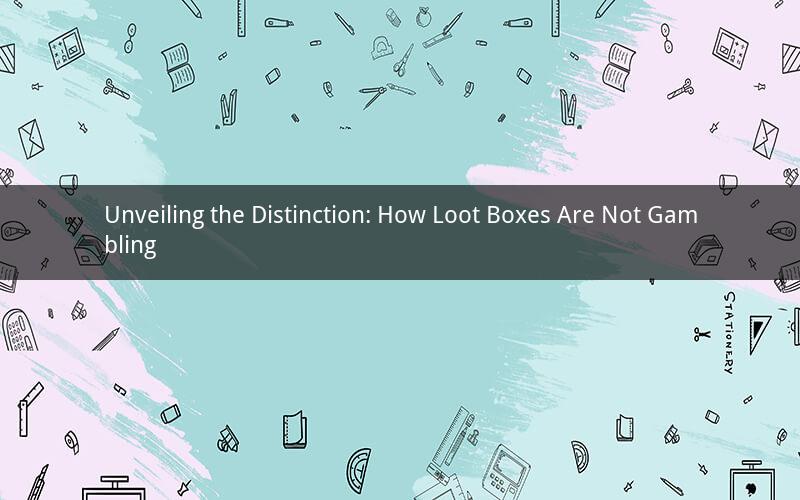
Introduction:
Loot boxes, a feature often found in modern video games, have been a topic of debate regarding their classification as gambling. While many argue that loot boxes are indeed gambling, there are compelling reasons to challenge this claim. This article aims to explore the nuances between loot boxes and gambling, highlighting why loot boxes should not be categorized as gambling.
1. Understanding Loot Boxes:
Loot boxes are virtual containers that players can purchase or receive as rewards for completing in-game activities. They contain random items, such as weapons, skins, cosmetics, or other in-game assets. The randomness aspect of loot boxes has led to the gambling comparison, but let's delve deeper into their characteristics.
1.1 Randomness and Uncertainty:
Similar to gambling, loot boxes introduce an element of randomness. However, the key difference lies in the nature of this randomness. In gambling, the outcome is uncertain, and the player's chances of winning are determined by chance. In contrast, loot boxes do not involve monetary gain or the possibility of losing money. Players are merely paying for the thrill of opening the boxes and discovering the contents, rather than seeking financial gain.
1.2 Voluntary Nature:
Loot boxes are optional purchases. Players have the choice to buy them or not, depending on their interest and financial capabilities. Unlike gambling, where individuals are often enticed by the promise of winning big, loot boxes do not create an environment of compulsion. Players who desire specific items can invest in loot boxes, but they are not forced to do so.
2. Distinction from Gambling:
To further emphasize the distinction between loot boxes and gambling, let's examine key factors that differentiate the two:
2.1 Lack of Real-World Value:
Loot boxes offer virtual items within the game, which hold no real-world value. Players may be enticed by the potential of obtaining rare or desirable items, but these items cannot be traded or sold outside the game's ecosystem. In contrast, gambling involves real money, and the stakes are tangible and measurable.
2.2 No Risk of Financial Loss:
Players who purchase loot boxes do so with the understanding that they may not receive their desired items. While this can be frustrating, there is no risk of financial loss. Players are not investing real money in the hope of winning something valuable; rather, they are spending money to enjoy the experience of opening the boxes.
2.3 Regulation and Consumer Protection:
Many countries have implemented regulations to protect consumers, particularly minors, from engaging in gambling activities. These regulations do not apply to loot boxes as they do not involve real money or gambling. Instead, governments focus on age restrictions and transparency regarding the contents of loot boxes.
3. The Role of Social Responsibility:
While loot boxes are not gambling, it is crucial for game developers and publishers to be socially responsible. They should provide clear information about the nature of loot boxes, including the probability of obtaining specific items. Additionally, implementing features like parental controls and allowing players to disable loot boxes can help protect vulnerable individuals.
4. The Psychological Aspect:
Loot boxes have been criticized for exploiting the psychological phenomenon of variable ratio reinforcement schedules. This technique encourages players to continue playing by offering intermittent rewards. However, it is essential to recognize that this does not make loot boxes gambling. The primary purpose of loot boxes is to enhance gameplay and provide additional content, not to generate financial profit.
5. Conclusion:
In conclusion, loot boxes should not be classified as gambling. While they share some similarities, such as an element of randomness, the key differences lie in the lack of real-world value, no risk of financial loss, and the voluntary nature of the purchases. By understanding the nuances between loot boxes and gambling, we can appreciate the distinction and ensure a healthy and enjoyable gaming experience for all players.
Questions and Answers:
1. Q: Can players sell or trade loot box items outside the game?
A: No, players cannot sell or trade loot box items outside the game's ecosystem. These items hold no real-world value and are meant to enhance gameplay within the game itself.
2. Q: Are there any age restrictions on purchasing loot boxes?
A: Yes, many countries have implemented age restrictions on purchasing loot boxes to protect minors. These restrictions vary by region and are enforced by game developers and publishers.
3. Q: Can loot boxes be disabled or removed from a game?
A: Some games provide options for players to disable or remove loot boxes entirely. This allows players who prefer not to engage in loot box purchases to continue playing without interference.
4. Q: Are there any regulations in place to ensure transparency regarding loot box contents?
A: Yes, some countries have regulations that require game developers and publishers to provide transparency regarding the contents of loot boxes. This includes providing information on the probability of obtaining specific items.
5. Q: Can loot boxes be considered a form of gambling due to their psychological impact?
A: While loot boxes may share some psychological similarities with gambling, they should not be classified as gambling. The primary purpose of loot boxes is to enhance gameplay and provide additional content, rather than to generate financial profit.